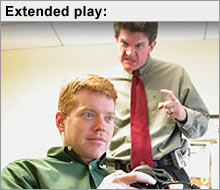Video games push for Olympic recognition
Global Gaming League talking with China to bring competitive gaming to the Beijing 2008 games
NEW YORK (CNNMoney.com) - A mouse, keyboard and/or Xbox controller don't seem like the standard gear of an Olympic athlete, but Ted Owen wants to change that. Owen, who runs the Global Gaming League (GGL), a media company focused on the lifestyle and culture of gaming, is currently talking with the Chinese government in hopes of bringing competitive video gaming to the 2008 Games as a demonstration sport.
Admittedly, it's an uphill battle. Even if you can look past the lack of physical skills necessary to play video games, the Olympics haven't had any sort of demonstration sport since 1992 - and Olympic experts say there has been no movement to bring them back. Owen, though, said he believes gaming's worldwide appeal - especially to a younger audience - could be the biggest boost to the Games since snowboarding. "People aren't watching [the Olympics] as much anymore," he argued. "You need to bring younger viewers back if you want to keep making money. To do that, you need to embrace non-traditional sports. They did it with snowboarding - and look how the popularity of that has surged in the Games. Video games deserve to be seen as a non-traditional sport. ... They would bring something to the Games that [that age group] engages in and everyone understands." Though gaming doesn't take much physical prowess (a quick glance at many of the most talented competitive gamers is confirmation enough), it does demand incredible hand-eye coordination - arguably as much as golf and tennis. There's big money in it, too. The best players can earn over $100,000 per year in tournaments - and several times that in endorsement deals. Companies from Microsoft (Research) to Intel (Research) currently sponsor teams of players and even venture capitalists are getting interested - Major League Gaming received $10 million in funding earlier this year from Ritchie Capital. Other big leagues include the World Cyber Games and Cyberathlete Professional League. Television networks are getting interested, too. NBC's USA Network will air a series of seven hour-long shows featuring Major League Gaming tournaments this fall. But financial and network interest don't earn a sport an Olympic berth; Just ask fans of golf, motorcycle racing and bowling - or, for that matter, baseball, which (along with softball) will be dropped from the Olympics in 2012. And the fact that video gaming is so technology dependent could be particularly damaging. "There's a big campaign in the [International Olympic Committee] to get kids away from computer terminals," said Ed Hula, editor and founder of Around the Rings, an Olympic newsletter. "[Lobbying for] video gaming would be like asking the IOC to approve power smoking." The GGL, through Owen and the company's Chinese branch in Chengdu, hasn't actually spoken with the IOC yet. All negotiations have been with the Chinese government, but Owen said they have been very encouraging. "There is interest at the highest levels," he said. "It is something that has momentum." China, he said, is an ideal place to debut competitive gaming on the Olympic stage, since it's such a major part of the Asian culture. In China alone, the market is forecast to top $2 billion annually by 2010 - and console manufacturers are fine tuning plans to enter the market now. (Piracy concerns add special challenges for publishers in the country.) "Gaming is elevated to a pastime in Asia," said Owen. "This is the natural place for an exhibition Olympic video game tournament to occur. If we get Chinese approval to do this and we present it to the IOC, it would be very unlikely to me that the IOC wouldn't consider that. The only reason they haven't done an exhibition sport in the past several years is no one has brought a good one to them." That's debatable. Hula said the reason behind the elimination of demonstration (or exhibition) sports was they were hurting the integrity of the Games. Further, organizers were unable to agree upon replacement medal sports for baseball and softball in 2012 and under Olympic rules will not be able to add any more until 2016. "If they can't figure out sports to give real medals to, then you can forget about them adding 'let's pretend' sports," said Hula. Competitive video gaming is also not currently recognized by the IOC. That puts it behind fields including billiards, bridge, chess and tug of war, which are all on the committee's list of recognized sports - considered the first step (but certainly not a guarantee) in becoming an Olympic sport. Owen, though, remains undeterred. "If the IOC pushed back on us and we had the Chinese government approving us, we would do it anyway," he said. "We may not have the circles, but we'd do it right by the stadiums and would bask in the glow of the Olympic light. ... Everyone wants to watch the best at anything ... and it's time to let people see the best this field has to offer." Mario creator outlines Nintendo's strategy. Read more here
Morris is Director of Content Development for CNNMoney.com. Send him an email at chris.morris@turner.com. |
| |||||||||||||||


